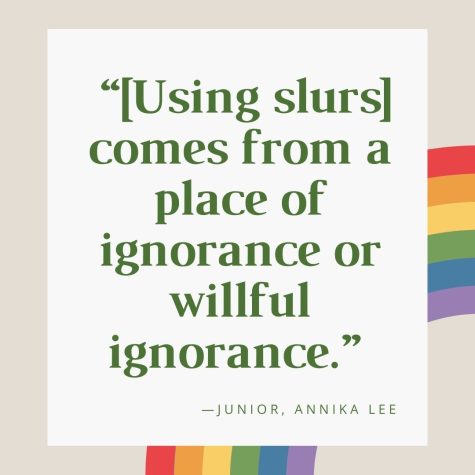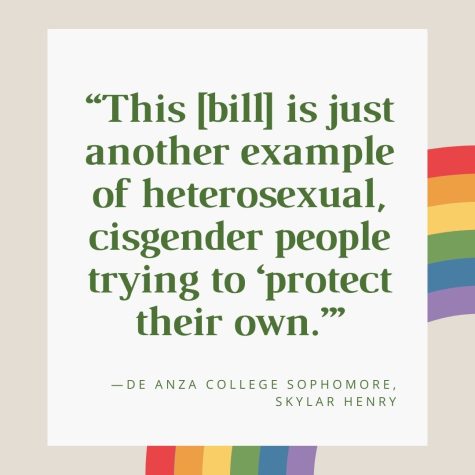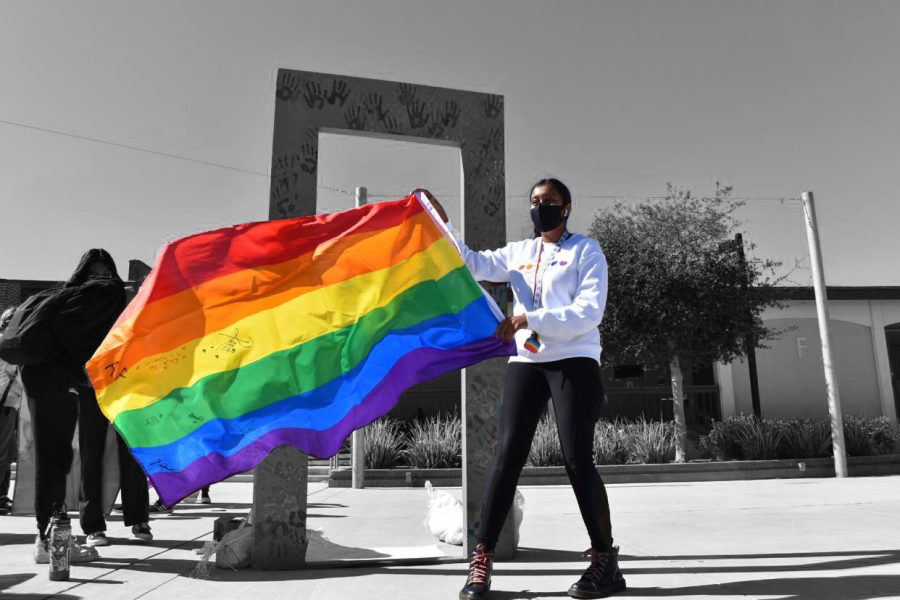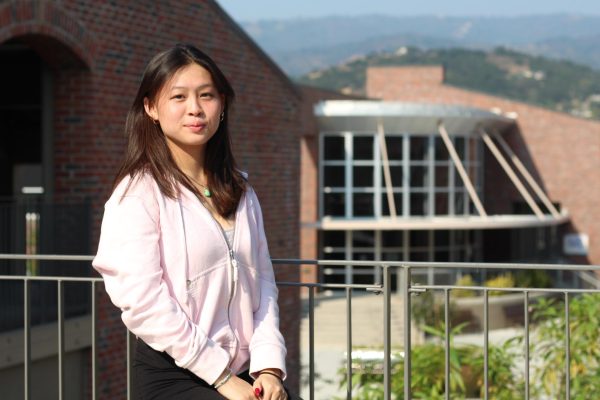LGBTQ rights
Students share their thoughts about relevant LGBTQ issues
Senior Geeta Karlcut waves the pride flag on Nov. 11, National Coming Out Day.
April 23, 2022
Junior and GSA president Annika Lee vividly recalls seeing the anti-queer vandalism on the walls of the gender neutral restroom behind the library on Tuesday, March 8. Upon viewing the toilet seat covers shoved into the toilet and the graffiti tags on the wall, she felt both disgusted and “disappointed that [they] would have to use a gendered restroom.”
“When [vandalism] happens, [trans students] no longer have [a] neutral environment to use the bathroom,” Lee said. “By making the gender neutral bathroom unusable, it forces trans people into a really unsafe and potentially violent environment.”
Sophomore Neil Mhamunkar agrees with Lee’s views and simultaneously emphasizes the importance of “leaving gender neutral restrooms as safe bathrooms and not hangout spots.” In addition to the blatant acts of transphobia displayed through the vandalism, Lee speaks out about the casual homophobia she often experiences, such as people “misgendering [them]” or using the word “gay” as an insult.
“[Using slurs] comes from a place of ignorance or willful ignorance,” Lee said. “At some level, [people] have to understand that it’s wrong, but they continue to use it anyway. It’s just so ingrained in their vernacular that they feel like they can’t change it, but I don’t think that should be an excuse at all.”

Lee hopes that the district will be able to implement LGBTQ Advisory lessons in its curriculum in order to better educate Monta Vista staff members and students. Lee believes that Advisory is an important first step in spreading awareness.
“I think starting the conversations is the biggest thing to do right now,” Lee said. “Once we start talking about how transphobia and homophobia still exist on Monta Vista’s campus, then we can start working to find solutions to dismantle them.”
On the other hand, Mhamunkar “doesn’t think Advisory is very helpful [when] talking about LGBTQ issues.” Nevertheless, Mhamunkar believes that Monta Vista can still supplement its advisories with experiences and knowledge from alternate sources that span beyond the FUHSD community.
“I think that the best thing would be to get someone who has a major in gender studies [to talk during Advisory],” Mhamunkar said. “Getting someone who is very educated on the topic, rather than a Biology teacher, to talk about [LGBTQ] issues would be better because then [students] can ask them questions.”
Skylar Henry, a sophomore at De Anza College, majors in sociology and specializes in women and gender studies. He currently is involved in De Anza’s Women Gender Sexuality Center, which hosts events and discussion groups where students come together to talk about the group’s feelings about gender identity, sexuality and the current political climate.
“In my experience, I don’t have a lot of LGBTQ friends that I’m close to, so having a group of students at my school that I can talk to is nice to have,” Henry said. “I’ve been so lucky to have schools that have been really supportive of me being transgender, but [then] you look at states like Florida who are passing [anti-queer] laws and realize that kids there don’t have that [same support].”
Henry references the “Don’t Say Gay Bill,” which Florida Republican Senator Ron DeSantis signed on March 28, which sparked outrage within the LGBTQ community. The bill bans “classroom instruction by school personnel or third parties on sexual orientation or gender identity” in kindergarten through third grade, and goes into effect July 1.
“This [bill] is just another example of heterosexual, cisgender people trying to ‘protect their own,’” Henry said. “When really, they’re not protecting themselves, they’re just harming [the LGBTQ community].”

While the bill impacts many in the LGBTQ community, Henry is “sad, but not surprised” by the bill itself, because of Florida’s conservative population. For instance, Henry has friends in Southern states who are unable to get surgery or hormone therapy, whereas in California, he has access to these resources through his health insurance. Henry believes that “[this] bill is just another way of trying to act like the [LGBTQ] community doesn’t exist or act like it’s not valid.”
Henry attributes the surge in anti-queer legislation to the election of Trump in 2016, and Lee agrees. She also believes that conservative lawmakers are using Trump’s election as a springboard when drafting anti-queer bills.
“I think there’s this whole buildup [where] it’s suddenly OK for people to be outright homophobic and transphobic, partially in part due to Trump’s election in 2016, where he was very actively queerphobic,” Lee said. “Now people are kind of capitalizing off of that and continuing to push for more anti-trans and anti-queer legislation.”
With tensions brewing throughout various states, Lee emphasizes the fact that “queer activism will continue” and claims that “the queer community will continue to make sure that these bills are removed and more anti-queer legislation don’t go through.” Henry agrees with Lee and believes that the community needs to unite now, more than ever.
“California has always been pretty good about being in solidarity with people of the LGBTQ [community],” Henry said. “But because other states are doing the opposite of that, it just gives [Californians] a reason to keep doing more [for the community]. A lot of people are feeling really defeated and discouraged [so] we need to work extra hard to make sure that students feel safe.”




























